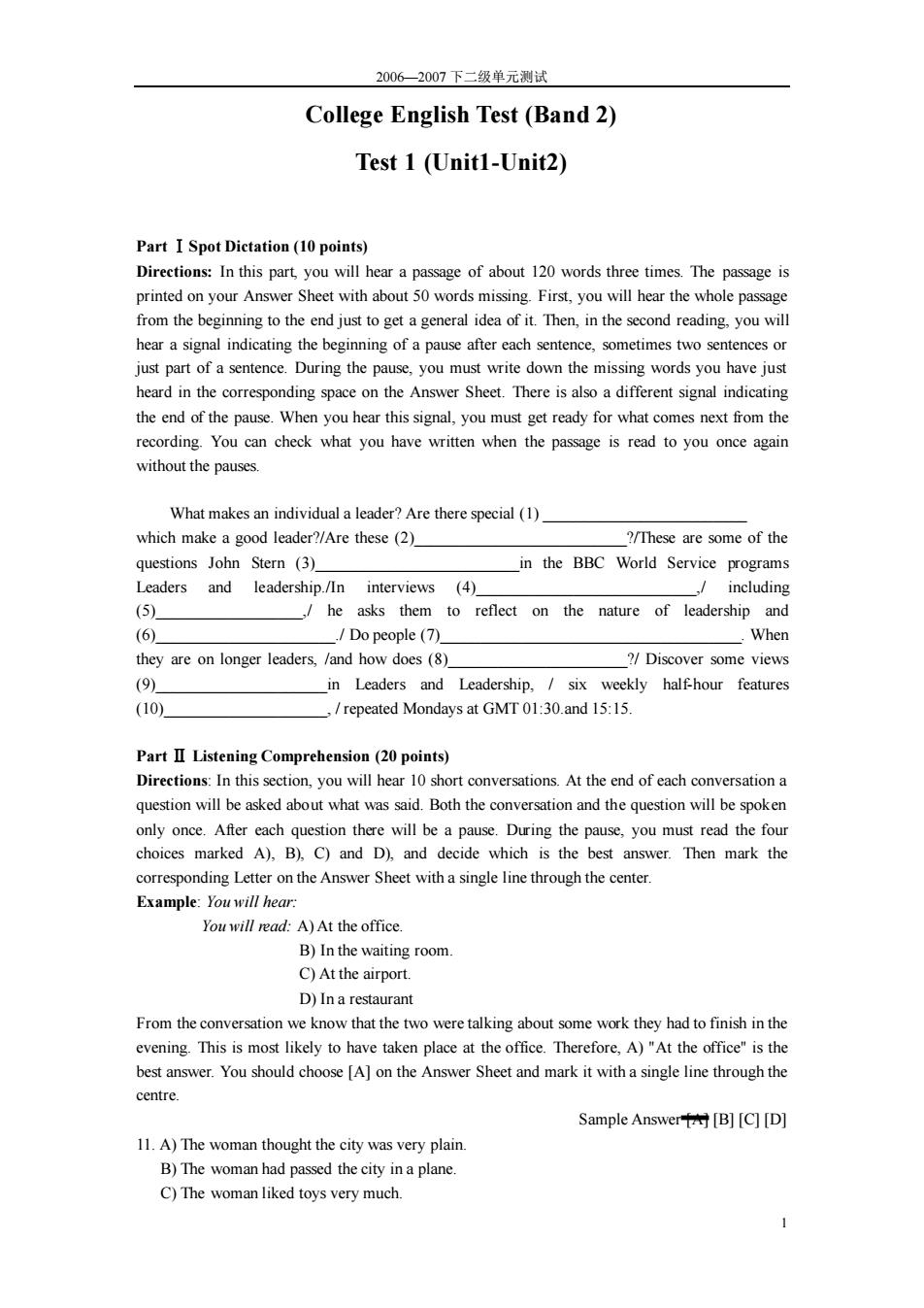
2006-2007下二级单元测试 College English Test(Band 2) Test 1 (Unit1-Unit2) Part I Spot Dietation(10 points) Direcion:In this parl you will hear a pasae of three tims The ais printed on your Answer Sheet with about 50 words missing.First,you will hear the whole passa from the beginning to the end just to get a general idea of it.Then,in the second reading,you wil hear a signal indicating the beginning of a pause after each sentence.sometimes two sentences or just part of a sentence.During the pause,you must write down the missing words you have just heard in the corresponding space on the Answer Sheet.There is also a different signal indicating the end of the paus en you hear this signal.you must get ready for wha mes next from the recording.You can check what you have written when the passage is read to you once agair without the pauses. What makes an individual a leader?Are there special (1) which make a good leader?/Are these (2) ?/These are some of the questions John Stern (3) in the BBC World Service programs Leaders and leadership./In interviews (4) including (5) ,he asks them to reflect on the nature of leadership and 6 Do people (7) When they are on longer leaders./and how does (8) Discover some view in Leaders ang Leadership,/six we ekly half-hour features (10) ./repeated Mondays at GMT 01:30.and 15:15 Part II Listening Comprehension(20 points) Directions:In this section.you will hear 10 short conversations.At the end of each conversation a question will be asked about what was said.Both the conversation and the qustion will be spoker only once.After each question there will be a pause.During the pause,you must read the fou choices marked A),B).C)and D),and decide which is the best answer.Then mark the corresponding Letter on the Answer Sheet with a single line through the center. Example:You will hear: You will read:A)At the office. B)Inthe waiting room C)At the airport. D)In a restaurant From the conversation we know that the two were talking about some work they had to finish in the gs5 mos likely to hve如ace a the ofe心6 ore A)the ofce5 answer.You she ould ch oose [A]on Answer eet and mark it witha single line through th centre Sample AnswerB]C]D] 11.A)The woman thought the city was very plain. B)The woman had passed the city in a plane. C)The woman liked toys very much
2006—2007 下二级单元测试 1 College English Test (Band 2) Test 1 (Unit1-Unit2) Part ⅠSpot Dictation (10 points) Directions: In this part, you will hear a passage of about 120 words three times. The passage is printed on your Answer Sheet with about 50 words missing. First, you will hear the whole passage from the beginning to the end just to get a general idea of it. Then, in the second reading, you will hear a signal indicating the beginning of a pause after each sentence, sometimes two sentences or just part of a sentence. During the pause, you must write down the missing words you have just heard in the corresponding space on the Answer Sheet. There is also a different signal indicating the end of the pause. When you hear this signal, you must get ready for what comes next from the recording. You can check what you have written when the passage is read to you once again without the pauses. What makes an individual a leader? Are there special (1) _________________________ which make a good leader?/Are these (2)__________________________?/These are some of the questions John Stern (3)_________________________in the BBC World Service programs Leaders and leadership./In interviews (4)___________________________,/ including (5)__________________,/ he asks them to reflect on the nature of leadership and (6)______________________./ Do people (7)_____________________________________. When they are on longer leaders, /and how does (8)______________________?/ Discover some views (9)_____________________in Leaders and Leadership, / six weekly half-hour features (10)____________________, / repeated Mondays at GMT 01:30.and 15:15. Part Ⅱ Listening Comprehension (20 points) Directions: In this section, you will hear 10 short conversations. At the end of each conversation a question will be asked about what was said. Both the conversation and the question will be spoken only once. After each question there will be a pause. During the pause, you must read the four choices marked A), B), C) and D), and decide which is the best answer. Then mark the corresponding Letter on the Answer Sheet with a single line through the center. Example: You will hear: You will read: A) At the office. B) In the waiting room. C) At the airport. D) In a restaurant From the conversation we know that the two were talking about some work they had to finish in the evening. This is most likely to have taken place at the office. Therefore, A) "At the office" is the best answer. You should choose [A] on the Answer Sheet and mark it with a single line through the centre. Sample Answer [A] [B] [C] [D] 11. A) The woman thought the city was very plain. B) The woman had passed the city in a plane. C) The woman liked toys very much
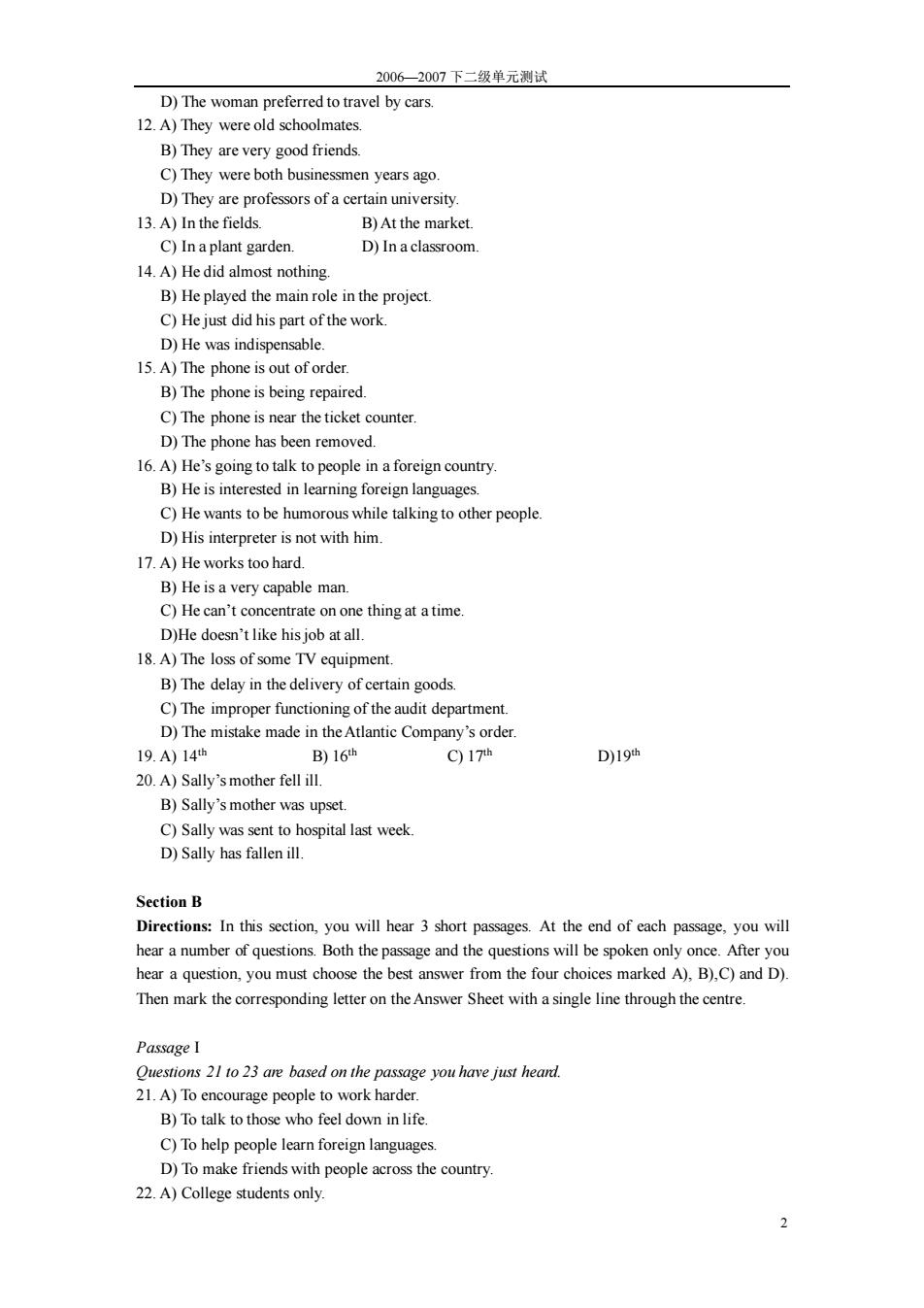
2006一2007下二级单元测试 D)The woman preferred to travel by cars. 12.A)They were old schoolmates B)They are very god frends C)They were both businessmen years ago. D)They are professors of a certain university. 13 A)In the fields B)at the market C)In a plant garden D)In a classroom 14.A)He did almost nothing B)Heplayed the main role in the project C)He just did his part of the work D)He was indispensable 15 A)The phone is out of order B)The phone is being repaired. C)The phone is near the ticket counter D)The phone has been removed 16.A)He's going to talk to people in aforeign country. B)He is interested in learning foreign languages. C)He wants to be humorous while talking to other people 17.A)He works too hard B)He is a very capable man C)He can't concentrate on one thing at atime. D)He doesn't like his job at all. 18.A)The loss of some TV equipment. B)The delay in the delivery of certain goods C)The improper functioning of the audit department. D)The mistake made in the Atlantic Company's order. 19A)14h B)16h C)17h D)19h 20 A)Sally's mother fell ill B)Sally'smother was upset C)Sally was sent to hospital last week. D)Sally has fallen ill. Section B Directions:In this section,you will hear3 short passages.At the end of each passage,you wil hear a number of questions.Both the passage and the questions will be spoken only once.After you hear a question,you must choose the best answer from the four choices marked A),B),C)and D) Then mark the corresponding letter on the Answer Sheet with a single line through the centre. Passage I B)To talk to those who feel down in life. C)To help people learn foreign languages D)To make friends with people across the country 22.A)College students only 2
2006—2007 下二级单元测试 2 D) The woman preferred to travel by cars. 12. A) They were old schoolmates. B) They are very good friends. C) They were both businessmen years ago. D) They are professors of a certain university. 13. A) In the fields. B) At the market. C) In a plant garden. D) In a classroom. 14. A) He did almost nothing. B) He played the main role in the project. C) He just did his part of the work. D) He was indispensable. 15. A) The phone is out of order. B) The phone is being repaired. C) The phone is near the ticket counter. D) The phone has been removed. 16. A) He’s going to talk to people in a foreign country. B) He is interested in learning foreign languages. C) He wants to be humorous while talking to other people. D) His interpreter is not with him. 17. A) He works too hard. B) He is a very capable man. C) He can’t concentrate on one thing at a time. D)He doesn’t like his job at all. 18. A) The loss of some TV equipment. B) The delay in the delivery of certain goods. C) The improper functioning of the audit department. D) The mistake made in the Atlantic Company’s order. 19. A) 14th B) 16th C) 17th D)19th 20. A) Sally’s mother fell ill. B) Sally’s mother was upset. C) Sally was sent to hospital last week. D) Sally has fallen ill. Section B Directions: In this section, you will hear 3 short passages. At the end of each passage, you will hear a number of questions. Both the passage and the questions will be spoken only once. After you hear a question, you must choose the best answer from the four choices marked A), B),C) and D). Then mark the corresponding letter on the Answer Sheet with a single line through the centre. Passage I Questions 21 to 23 are based on the passage you have just heard. 21. A) To encourage people to work harder. B) To talk to those who feel down in life. C) To help people learn foreign languages. D) To make friends with people across the country. 22. A) College students only
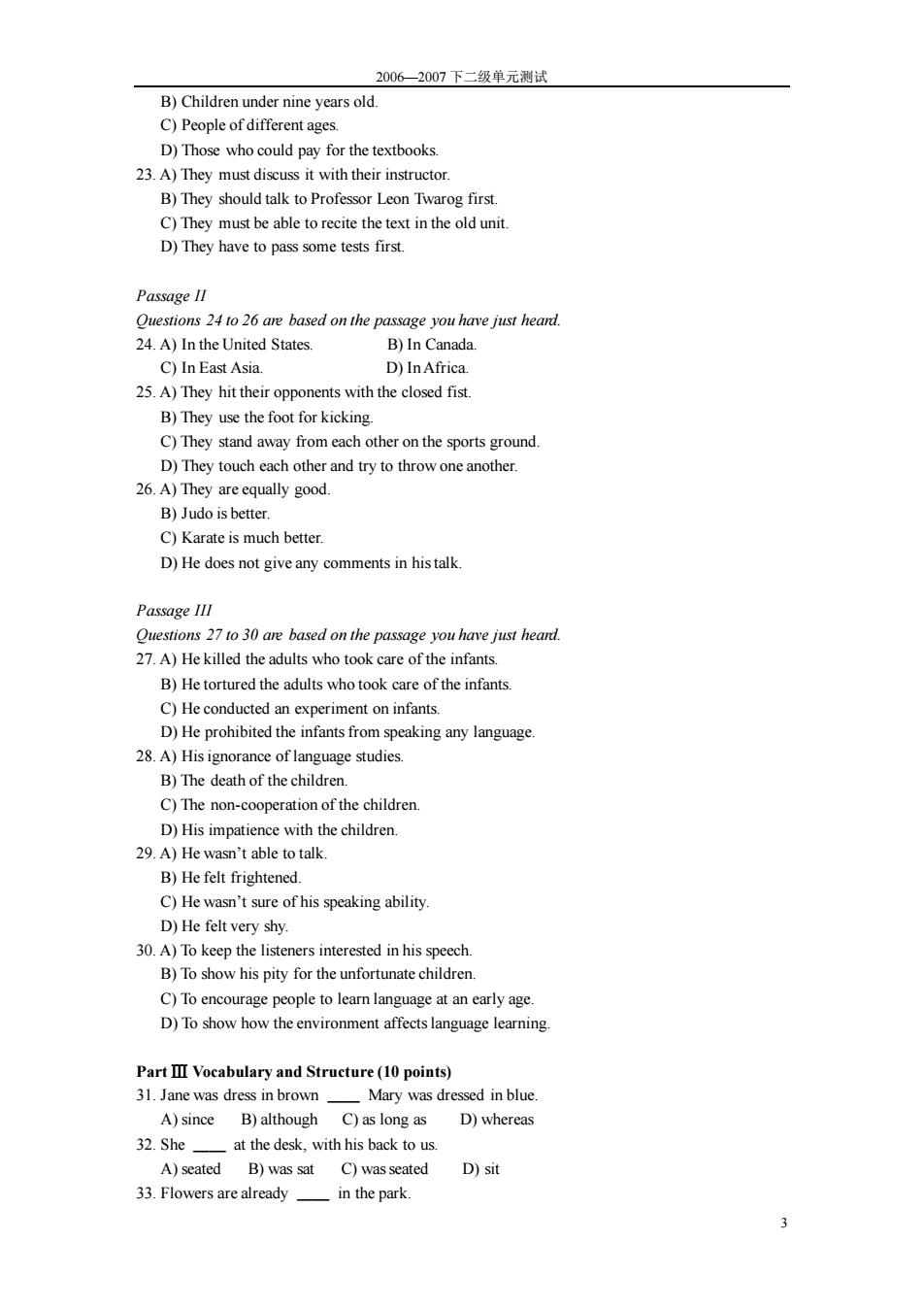
2006-2007下二级单元测试 B)Children under nine years old. C)People of different ages. D)Those who could pay for the textbooks. 3.A)They must d uss it with their instructor. B)They should talk to Professor Leon Twarog first. C)They must be able to recite the text in the old unit. D)They have to pass some tests first. Passage I Questions 24 t026 are based on the passage you have just heard 24.A)In the United States B)In Canada. C)In East asia D)In Africa 25.A)They hit their opponents with the closed fist. B)They use the foot for kicking C)They stand away from each other on the sports ground D)They touch each other and try to throw one another. 26.A)They are equally good. B)Judo is better. C)Karate is much better D)He does not give any comments in histalk Passage I Questions 27 t0 30 are based on the passage you have just heard. 27.A)He killed the adults who took care of the infants B)Hetortured the adults whotook care of the infants C)He conducted an experiment on infants D)He prohibited the infants from speaking any language 28.A)His ignorance of language studies. B)The death of the children of the children D)His impatience with the children. 29.A)He wasn't able to talk B)He felt frightened. C)He wasn't sure of his speaking ability D)He felt very shy. 0.A)Toke the listeners interested inhis spech B)Toshow his pity for the unfortunate children C)To encourage people to learn language at an early age. D)To show how the environment affects language learning ary was dressed in blue A)since B)although C)as long as D)whereas 32 She at the desk,with his back to us. A)seated B)was sat C)wasseated D)sit 33.Flowers are already in the park
2006—2007 下二级单元测试 3 B) Children under nine years old. C) People of different ages. D) Those who could pay for the textbooks. 23. A) They must discuss it with their instructor. B) They should talk to Professor Leon Twarog first. C) They must be able to recite the text in the old unit. D) They have to pass some tests first. Passage II Questions 24 to 26 are based on the passage you have just heard. 24. A) In the United States. B) In Canada. C) In East Asia. D) In Africa. 25. A) They hit their opponents with the closed fist. B) They use the foot for kicking. C) They stand away from each other on the sports ground. D) They touch each other and try to throw one another. 26. A) They are equally good. B) Judo is better. C) Karate is much better. D) He does not give any comments in his talk. Passage III Questions 27 to 30 are based on the passage you have just heard. 27. A) He killed the adults who took care of the infants. B) He tortured the adults who took care of the infants. C) He conducted an experiment on infants. D) He prohibited the infants from speaking any language. 28. A) His ignorance of language studies. B) The death of the children. C) The non-cooperation of the children. D) His impatience with the children. 29. A) He wasn’t able to talk. B) He felt frightened. C) He wasn’t sure of his speaking ability. D) He felt very shy. 30. A) To keep the listeners interested in his speech. B) To show his pity for the unfortunate children. C) To encourage people to learn language at an early age. D) To show how the environment affects language learning. Part Ⅲ Vocabulary and Structure (10 points) 31. Jane was dress in brown __ Mary was dressed in blue. A) since B) although C) as long as D) whereas 32. She __ at the desk, with his back to us. A) seated B) was sat C) was seated D) sit 33. Flowers are already __ in the park
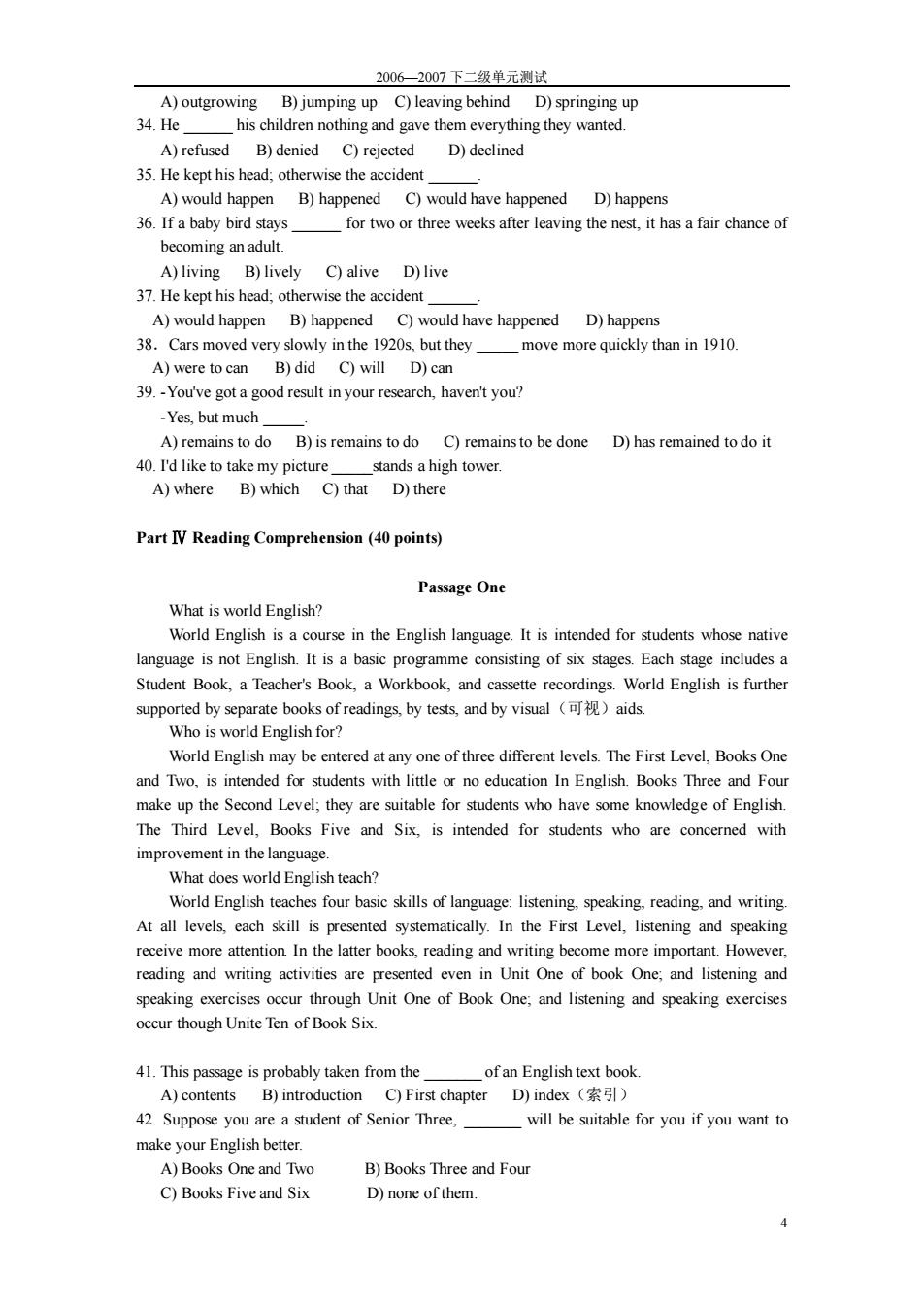
2006—2007下二级单元测试 A)outgrowing B)jumping up C)leaving behind D)springing up 34.He his children nothing and gave them everything they wanted. A)refused B)denied C)rejecte D)declined 35.He kept his head;otherwise the accident A)would happen B)happened C)would have happened D)happens 36 Ifa baby bird stays for two or three weeks after leaving the nest,it has a fair chance of hecoming an adult A)living B)lively C)alive D)live 37.He kept his head,otherwise the accident A)would happen B)happened C)would have happened D)happens 38.Cars moved very slowly in the 1920s,but they move more quickly than in 1910. A)were to can B)did C)will D)can 39.-You've got a good resut in your research,haven't you? -Yes,but mucl A)remains to do B)is remains to do C)remainsto be done D)has remained to do it 40.I'd like to take my picture stands a high tower. A)where B)which C)that D)there Part IV Reading Comprehension (40 points) Passage One What is world English? World English is a course in the English language.It is intended for students whose native Sndent Both三ea supported by separate books of readings,by tests,and by visual (aids. Who is world English for? World English may be entered at any one of three different levels.The First Level,Books One itable for stu have m knowledge of English The Third Level,Books Five and Six,is intended for students who are concerned with improvement in the language. What does world English teach? World English four bi: At all levels, each skill is pre Level, listening and speaking ive more attention In the latter books,reading and writing beco me more important.However reading and writing activities are presented even in Unit One of book One;and listening and speaking exercises occur through Unit One of Book One;and listening and speaking exercises occur though Unite Ten of Book Six. 41.This passage is probably taken from the ofan English text book A)contents B)introduction C)First chapter D)index ( 42.Suppose you are a student of Senior Three. will be suitable for you if you want to make your English better. A)Books One and Two B)Books Three and Four C)Books Fiveand Six D)none of them 4
2006—2007 下二级单元测试 4 A) outgrowing B) jumping up C) leaving behind D) springing up 34. He ______ his children nothing and gave them everything they wanted. A) refused B) denied C) rejected D) declined 35. He kept his head; otherwise the accident ______. A) would happen B) happened C) would have happened D) happens 36. If a baby bird stays ______ for two or three weeks after leaving the nest, it has a fair chance of becoming an adult. A) living B) lively C) alive D) live 37. He kept his head; otherwise the accident ______. A) would happen B) happened C) would have happened D) happens 38.Cars moved very slowly in the 1920s, but they _____ move more quickly than in 1910. A) were to can B) did C) will D) can 39. -You've got a good result in your research, haven't you? -Yes, but much _____. A) remains to do B) is remains to do C) remains to be done D) has remained to do it 40. I'd like to take my picture _____stands a high tower. A) where B) which C) that D) there Part Ⅳ Reading Comprehension (40 points) Passage One What is world English? World English is a course in the English language. It is intended for students whose native language is not English. It is a basic programme consisting of six stages. Each stage includes a Student Book, a Teacher's Book, a Workbook, and cassette recordings. World English is further supported by separate books of readings, by tests, and by visual(可视)aids. Who is world English for? World English may be entered at any one of three different levels. The First Level, Books One and Two, is intended for students with little or no education In English. Books Three and Four make up the Second Level; they are suitable for students who have some knowledge of English. The Third Level, Books Five and Six, is intended for students who are concerned with improvement in the language. What does world English teach? World English teaches four basic skills of language: listening, speaking, reading, and writing. At all levels, each skill is presented systematically. In the First Level, listening and speaking receive more attention. In the latter books, reading and writing become more important. However, reading and writing activities are presented even in Unit One of book One; and listening and speaking exercises occur through Unit One of Book One; and listening and speaking exercises occur though Unite Ten of Book Six. 41. This passage is probably taken from the _______ of an English text book. A) contents B) introduction C) First chapter D) index(索引) 42. Suppose you are a student of Senior Three, _______ will be suitable for you if you want to make your English better. A) Books One and Two B) Books Three and Four C) Books Five and Six D) none of them
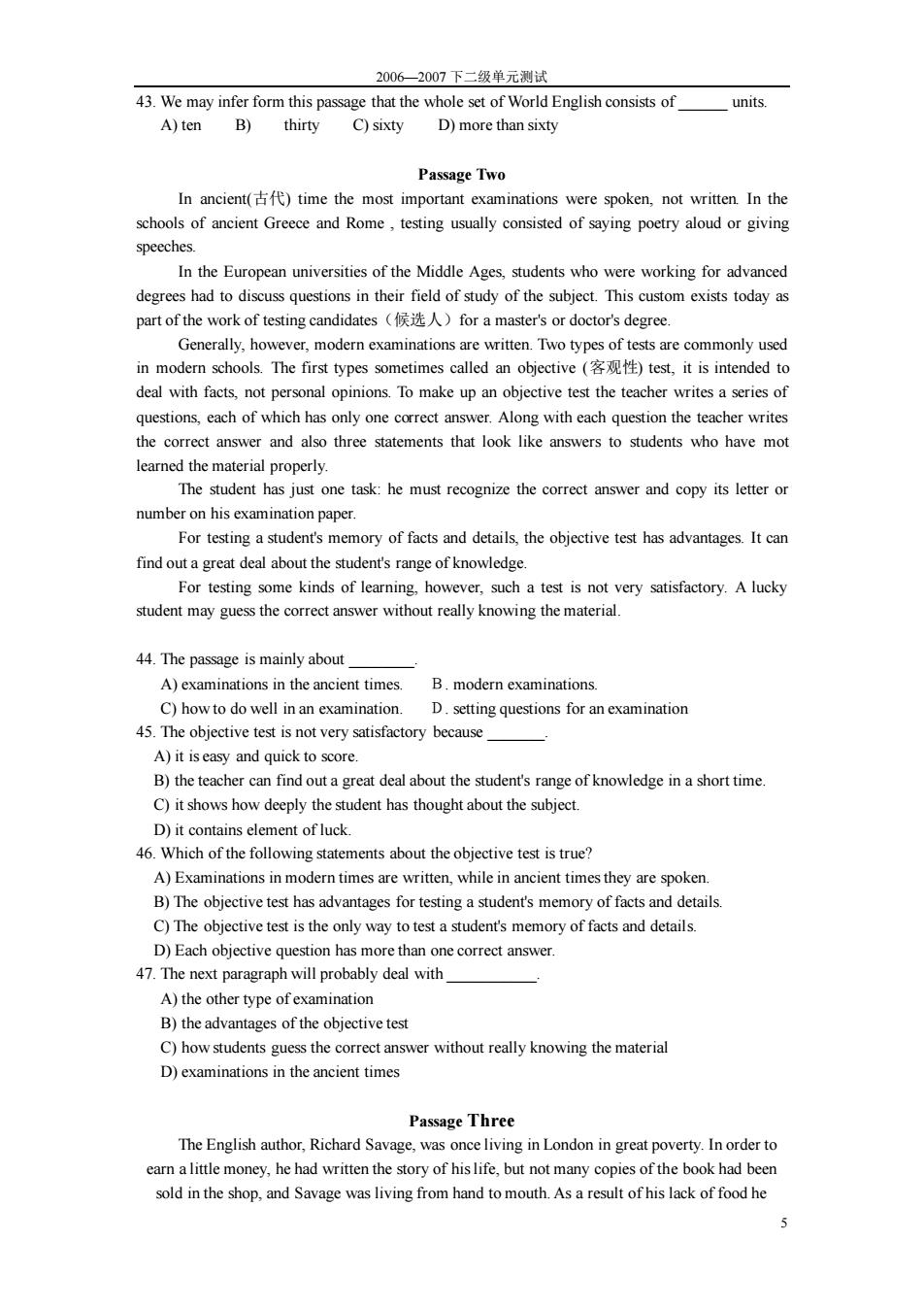
2006—2007下二级单元测试 43.We may infer form this passage that the whole set of World English consists of units. A)ten B)thirty C)sixty D)more than sixty Passage Two In ancient(time the most important examinations were spoken,not written.In the schools of ancient Greece and Rome,testing usually consisted of saying poetry aloud or giving speeches. In the European universities of the Middle Ages,students who were working for advanced degrees had to discuss questions in the field of study of the subject.This customexists today as part of the work of testing candidates (for a master's or doctor's degree. Generally,however.modern examinations are written.Two types of tests are commonly used in modern schools.The first types sometimes called an objective (test,it is intended to deal with facts.not personal opinions To make up an obiective test the teacher writes a series of queionscahofwhichsoalyoae6caTctansNet.Ao ng with each quest n the teacher writes the correct answer and also three statements that look like answers to students who have mot learned the material properly. The student has just one task:he must recognize the correct answer and copy its letter or number on his examination paper. For testing astudent's memory of facts and details,the objective test has advantages Itcan find out a great deal about the stu ent's range of knowledge For testing some kinds of learning.however.such a test is not very satisfactory.A lucky student may guess the correct answer without really knowing the material 44.The passage is mainly about A)examinations in the ancient times B.modern examinations C)how to do well in an examination D.setting questions for an examination 45.The objective test is not very satisfactory because A)it is easy and quick to score. B)the teacher can find out a great deal about the student's range of knowledge in a short time C)it shows how deeply the stu dent has thought about the subject D)it contains element of luck 46.Which of the following statements about the objective test is true? A)Examinations in modern times are written.while in ancient times they are spoken B)The obiective test has advantages for testing a student's memory of facts and details C)The objective test is the ony way to test a student's memory of facts and details. D)Each objectivequ on ha s more than one correct answer 47.The next paragraph will probably deal with A)the other type of examination B)the advantages of the objective test dens ues the correct answer without reallyng the m Passage Three The English author,Richard Savage,was once living in London in great poverty.In order to earn alittle money,he had written the story of hislife,but not many copies of the book had been sold in the shop.and Savage was living from hand to mouth.As a result of his lack of food he 5
2006—2007 下二级单元测试 5 43. We may infer form this passage that the whole set of World English consists of ______ units. A) ten B) thirty C) sixty D) more than sixty Passage Two In ancient(古代) time the most important examinations were spoken, not written. In the schools of ancient Greece and Rome , testing usually consisted of saying poetry aloud or giving speeches. In the European universities of the Middle Ages, students who were working for advanced degrees had to discuss questions in their field of study of the subject. This custom exists today as part of the work of testing candidates(候选人)for a master's or doctor's degree. Generally, however, modern examinations are written. Two types of tests are commonly used in modern schools. The first types sometimes called an objective (客观性) test, it is intended to deal with facts, not personal opinions. To make up an objective test the teacher writes a series of questions, each of which has only one correct answer. Along with each question the teacher writes the correct answer and also three statements that look like answers to students who have mot learned the material properly. The student has just one task: he must recognize the correct answer and copy its letter or number on his examination paper. For testing a student's memory of facts and details, the objective test has advantages. It can find out a great deal about the student's range of knowledge. For testing some kinds of learning, however, such a test is not very satisfactory. A lucky student may guess the correct answer without really knowing the material. 44. The passage is mainly about ________. A) examinations in the ancient times. B. modern examinations. C) how to do well in an examination. D. setting questions for an examination 45. The objective test is not very satisfactory because _______. A) it is easy and quick to score. B) the teacher can find out a great deal about the student's range of knowledge in a short time. C) it shows how deeply the student has thought about the subject. D) it contains element of luck. 46. Which of the following statements about the objective test is true? A) Examinations in modern times are written, while in ancient times they are spoken. B) The objective test has advantages for testing a student's memory of facts and details. C) The objective test is the only way to test a student's memory of facts and details. D) Each objective question has more than one correct answer. 47. The next paragraph will probably deal with ___________. A) the other type of examination B) the advantages of the objective test C) how students guess the correct answer without really knowing the material D) examinations in the ancient times Passage Three The English author, Richard Savage, was once living in London in great poverty. In order to earn a little money, he had written the story of his life, but not many copies of the book had been sold in the shop, and Savage was living from hand to mouth. As a result of his lack of food he